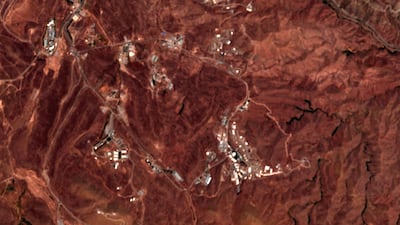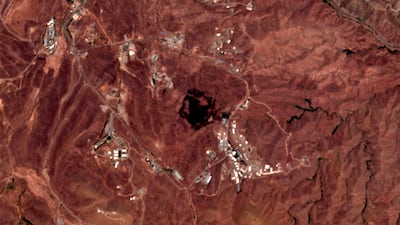Iran has begun the process of enriching uranium to 20 per cent purity with advanced centrifuges at its Fordow site, the UN’s nuclear watchdog said, in yet another breach of the deal Tehran agreed to with world powers in 2015.
The International Atomic Energy Agency announced the country's latest nuclear activities after agreeing with Tehran “to increase the frequency of verification” at the Fordow facility.
The move is likely to inflame tension in Vienna, where negotiations continue to revive the 2015 nuclear accord, officially known as the Joint Comprehensive Plan of Action.
Tehran has repeatedly violated the terms of the 2015 accord, enriching uranium well above the agreed upon limits and increasing its installation of advanced centrifuges, which allow Iran to enrich uranium at a faster pace.
Those breaches came in response to former US president Donald Trump withdrawing from the deal in 2018 and reinstating the heavy economic sanctions on Iran that had been lifted under the JCPOA.
Six rounds of talks were held in Vienna this year, attended by officials from China, France, Germany, Russia, the UK, the US and Iran, but had been on hold since June.
European diplomats have said addressing Iran's use of the advanced centrifuges to enrich uranium is still a crucial sticking point in the negotiations.
Under the 2015 deal, Iran limited uranium enrichment — a process that can yield fissile material for nuclear bombs — in return for relief from US, EU and UN sanctions. Iran insists the aims of its nuclear programme are peaceful.
“The advanced centrifuges present a conundrum because they constitute both an irreversible gain in knowledge and because if not destroyed, they can be quickly reassembled in the future, making it hard to meet the one-year breakout criterion [of preventing Iran from being able to produce a weapon's worth of highly enriched uranium],” said Mark Fitzpatrick, an associate fellow at the International Institute for Strategic Studies and former acting deputy assistant secretary for non-proliferation at the US State Department.
“But under the JCPOA, centrifuges that were removed from operation only had to be put in storage, so Iran has a point in arguing that the demand for destruction is not in keeping with the 2015 deal.”
US President Joe Biden has said America is willing to re-enter the deal, though the Vienna negotiations are taking place with the indirect involvement of US officials.
“As we have said, we believe it remains possible to quickly reach and implement an understanding on return to mutual full compliance with the JCPOA by closing the small number of issues that remained outstanding at the end of the sixth round of talks in June,” a State Department spokesman said in the latest update on the talks.
Trumpeting lies
Iranian officials launched a broadside on Wednesday at Israel, accusing it of "trumpeting lies to poison" the Vienna talks where all parties in the negotiations faced a test of their political will to complete the job.
"Israeli regime whose existence relies on tension is at it again, trumpeting lies to poison Vienna talks," Iranian Foreign Ministry spokesman Saeed Khatibzadeh posted on Twitter without specifying what Israeli comments he meant.
"All parties in the room now face a test of their independence & political will to carry out the job— irrespective of the fake news designed to destroy prospects for success," he added.




